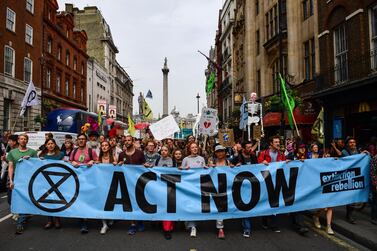In April, Extinction Rebellion activists glued themselves to the entrance of Shell's offices in London. Last Monday, Greenpeace installed heavy boxes in front of the doors to BP's premises, preventing staff from getting to work. But perhaps the most important environmental examination came from investors at the annual general meetings of the two companies last week. National oil companies (NOCs) may be relieved they do not face similar pressure – but it will come, and they need to be prepared for it.
The campaigners want the oil companies to shut down or convert their businesses entirely to renewable energy. Shell in particular is no stranger to such action; there was Brent Spar controversy in 1995, when Greenpeace challenged its disposal plans of an old oil platform. But the objections have centred ever more on climate and there are demands for a rapid move to a carbon-neutral future.
Some of the questions at the companies' meetings were by environmental activists, who had bought a few shares to gain the right to speak. But most were by major investors who have either committed to making their businesses compatible with climate targets or are at least concerned about the long-term viability of oil majors' business models in a future of tightening carbon constraints. Such investors might represent $23 trillion (Dh84tn) of capital worldwide, according to a BlackRock report.
While BP has committed to reduce its emissions, a shareholder resolution to set targets for greenhouse gases from its products by the end users was defeated. Shell has committed to track these emissions too. The American companies are lagging badly, but Occidental, the most climate progressive, announced last week plans for a massive plant to suck carbon dioxide directly from the air and use it to extract oil.
Activist investors and environmental campaigners have so far barely challenged NOCs. A rare exception, in 2013, when a Greenpeace ship challenged drilling by Russia's state companies Rosneft and Gazprom in the Arctic, was met by the arrest and harsh treatment of 30 protesters, who were eventually released.
Some NOCs, such as the Russians, Norway's Equinor, Brazil's Petrobras, and international subsidiaries of the Chinese majors, have minority listings with non-state shareholders. But most NOCs, such as Petronas of Malaysia, Pemex of Mexico or Sonatrach of Algeria, are entirely state-held.
For their host governments, NOCs are the main custodian and operator of national resource wealth, which won't be cast aside lightly. They consider their low-cost oil and gas resources will continue in production even if extraction is forced to cease elsewhere. So, NOCs may feel they face little public pressure to have answers on climate or plans for reducing their carbon footprint. But this would be a mistake, for the reasons of capital, personnel, projects and markets.
Even if they do not have public shareholders, NOCs are increasingly raising capital through bonds and through private investments. Financiers are also facing growing scrutiny on their climate footprint.
For employees, whether expatriates or citizens, younger people in particular are concerned about the environment, and tend to see the petroleum business as a sunset industry that will not assure a lifetime career. The boom and bust of oil prices and cycles of layoffs does not help either.
NOCs are venturing ever more beyond their home bases, particularly "downstream" - oil storage, refining, petrochemicals and fuel retail. Such project investments will be increasingly challenged by activists and host communities, unless their promoters are known to be responsible about climate change.
NOCs' main customers are increasingly not the mature markets of Europe, Japan and North America, but fast-growing economies in Asia, the Middle East and one day, Africa. Even if these countries are less environmentally conscious than Europe today, they are on the front line of climate emergency. Wildfires, heatwaves, droughts and floods can rapidly change minds.
When NOCs diversify into areas such as petrochemicals, imports into other countries may face stricter restrictions or tariffs when their carbon footprint is deemed too high. The UK has recently announced plans to ban single-use plastic products such as straws.
What the NOCs should do, though, is a difficult question. They can boost energy efficiency, stop flaring and clean up methane leaks, but these are the bare minimum. They can progressively shift from oil to gas, as the European supermajors are already doing. But gas, though cleaner, is still carbon-based.
Shell, BP or Total can venture, as they already are, into solar power, offshore wind, electric vehicle charging, biofuels, batteries and other low-carbon options. The NOCs can do this too, but can never become pure renewable or electricity companies: their raison d'etre is their control of the world's largest and cheapest hydrocarbon resources. They need feasible environmentally-friendly ways to use hydrocarbons – and a viable story for financiers, campaigners and the general public – which must be a topic for future articles.
Robin Mills is chief executive of Qamar Energy, and author of The Myth of the Oil Crisis







